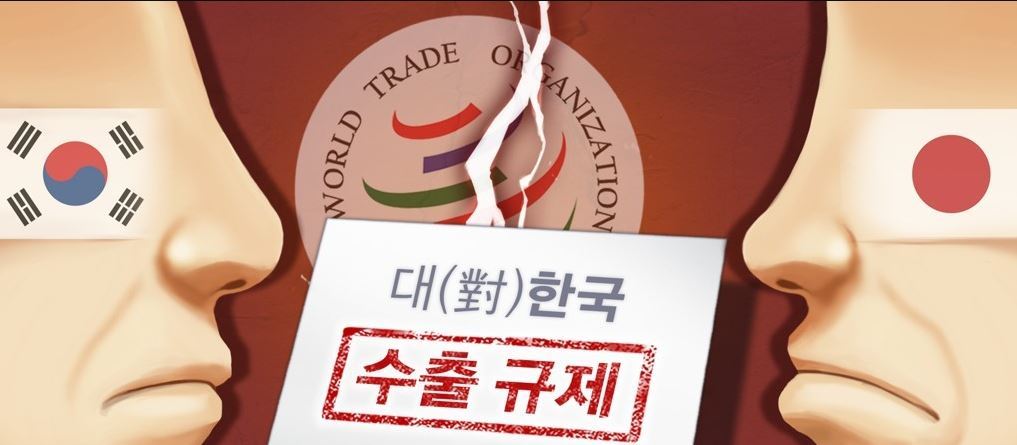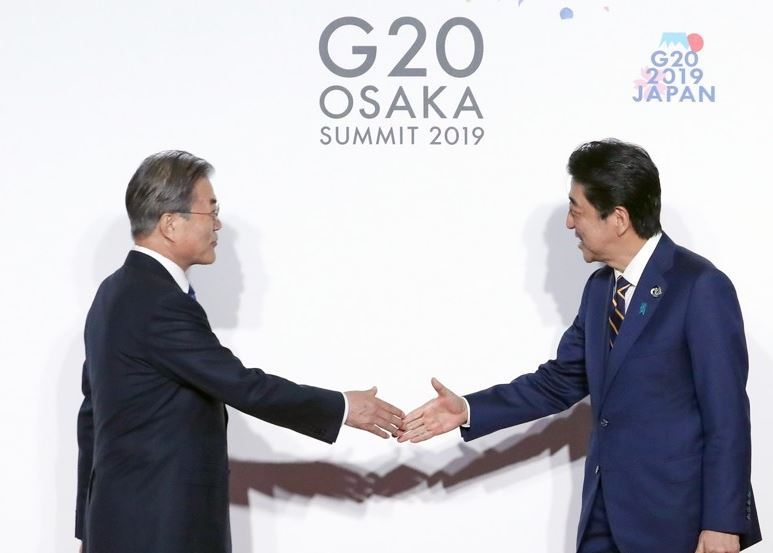The long-fraught ties between South Korea and Japan are plunging to a new low, as their intractable historical issues are bleeding into the economic domain, with voices for reconciliation drowned out by domestic politics, nationalism and mutual distrust.
On Monday, Tokyo blindsided Seoul by announcing that it would tighten restrictions on several key chemical exports to South Korea in an apparent response to last year's Supreme Court rulings here against Japanese firms over wartime forced labor.
 |
(Yonhap) |
The retaliatory measure aggravated tensions in the already acrimonious relationship long plagued by historical and territorial feuds stemming from Japan's 1910-45 colonization of the peninsula -- and left observers scratching their heads over the latest flare-up.
"It's one of the worst chapters of the bilateral ties given that it is quite rare for one side to take such a specific, concrete policy step against the other, while in the past, the neighbors had just squabbled over their thorny issues," Park Won-gon, a professor of international politics at Handong Global University, said.
While announcing the export control measure, Tokyo's industry ministry said that "it must be said that the relations of trust between Japan and South Korea have been significantly harmed" -- an indication that the step is related to the historical issue.
Tokyo has protested the South's top court rulings that ordered Japanese firms to compensate South Korean victims of forced labor.
It insists that all reparation issues were settled under a 1965 government-to-government accord aimed at normalizing bilateral relations.
The top court, however, recognized victims' individual rights to claim damages, while the government in Seoul maintains that it can't step into civil litigation under a democratic constitution that guarantees the separation of the executive, judicial and legislative powers.
After Tokyo's requests for diplomatic talks over the issue and then for the formation of an arbitration panel, Seoul recently proposed that South Korean and Japanese firms form a joint fund to compensate the victims. But Tokyo turned it down.
Japan's decision to tighten the export curbs drew sharp criticism as it overshadowed Saturday's declaration of the two-day Group of 20 summit in Osaka that called for a "free, fair, non-discriminatory, transparent, predictable and stable trade and investment environment."
In response to the decision, Seoul's Industry Minister Sung Yun-mo vowed on Monday to take "necessary" steps, including filing a complaint with the World Trade Organization (WTO).
But in an interview with Japan's Yomiuri Shimbun published Tuesday, Prime Minister Shinzo Abe said that Tokyo's decision is in compliance with the WTO rules and unrelated to free trade principles.
 |
(Yonhap) |
In a reflection of their frosty ties, South Korean President Moon Jae-in and Abe failed to arrange a bilateral summit during the G-20 gathering after their brief handshake just for photo ops.
The Osaka forum served as a stark reminder of the current status of the troubled relationship and represented a lost opportunity for both countries to set the mood for reconciliation through summitry, observers pointed out.
"The absence of any candid talks at the G-20 gathering and the apparent sense of coldness between them was quite disheartening," Chun In-young, an emeritus professor at Seoul National University, said.
"The two countries are not at a point of no return yet. They need to find an off-ramp out of the conflict and enter behind-the-scenes discussions based on the shared understanding that the situation should not be left to worsen," he added.
Domestic politics could have partially driven Tokyo's decision on the export measure against Seoul, critics said, as Abe is angling for his ruling Liberal Democratic Party's win in the July 21 upper-house parliamentary election seen as a crucial test of public sentiment.
Apparently to rally conservatives ahead of the election season, the hawkish premier has been hardening his stance on South Korea in the wake of the court rulings over forced labor and Seoul's decision to disband a Tokyo-funded foundation to support victims of Japan's wartime sexual slavery.
Early this year, the diplomatic tussle appeared to be spilling over even into the security domain, as Japan's maritime patrol aircraft conducted menacing low-altitude flybys over South Korean warships in December and January, following its accusations that a South Korean warship had locked fire-control radar on its plane.
Now, the spat seems to be escalating into the economic realm, stirring fears that South Korean firms could bear the full brunt and triggering calls for a way to reduce the country's trade reliance on Japan.
The escalating tensions came amid stepped-up diplomatic engagement with North Korea, which had long been the shared security challenge that glued Seoul and Tokyo together.
At times of renewed spats between its core Asian allies, the US has often sought to defuse tensions and encouraged them to focus on bolstering three-way cooperation in confronting North Korea's nuclear and missile threats.
But Washington's mediation role appears to have waned amid the peace efforts with Pyongyang and US President Donald Trump's seemingly transactional foreign policy approach that puts American interests first, observers said.
To bring its relations with Tokyo back on track, Seoul has constantly reaffirmed its commitment to the "future-oriented" partnership.
Moon has repeated Seoul's two-track approach of separating key cooperation issues from the historical issue, while Foreign Minister Kang Kyung-wha publicly stated Seoul's "clear will" to enhance relations with Japan.
But analysts called for more "preemptive and proactive" efforts to restore ties with Japan through the "careful and pragmatic" examination of its foreign policy tendencies.
Since retaking power in late 2012, Abe has appeared keen to advance his conservative, nationalist agenda, as the county has been striving to restore its national pride hurt in part by social anxiety from repeated natural disasters and the rise of its neighbors such as China, which overtook it as the world's second-largest economy in 2010.
"Rather than being just preoccupied with inter-Korean relations and the peace process involving the North and the US, Seoul needs to take an active approach to prevent the relations with Tokyo from further worsening," said Chun of Seoul National University. (Yonhap)







![[Exclusive] Hyundai Mobis eyes closer ties with BYD](http://res.heraldm.com/phpwas/restmb_idxmake.php?idx=644&simg=/content/image/2024/11/25/20241125050044_0.jpg)
![[Herald Interview] 'Trump will use tariffs as first line of defense for American manufacturing'](http://res.heraldm.com/phpwas/restmb_idxmake.php?idx=644&simg=/content/image/2024/11/26/20241126050017_0.jpg)
![[Herald Review] 'Gangnam B-Side' combines social realism with masterful suspense, performance](http://res.heraldm.com/phpwas/restmb_idxmake.php?idx=644&simg=/content/image/2024/11/25/20241125050072_0.jpg)